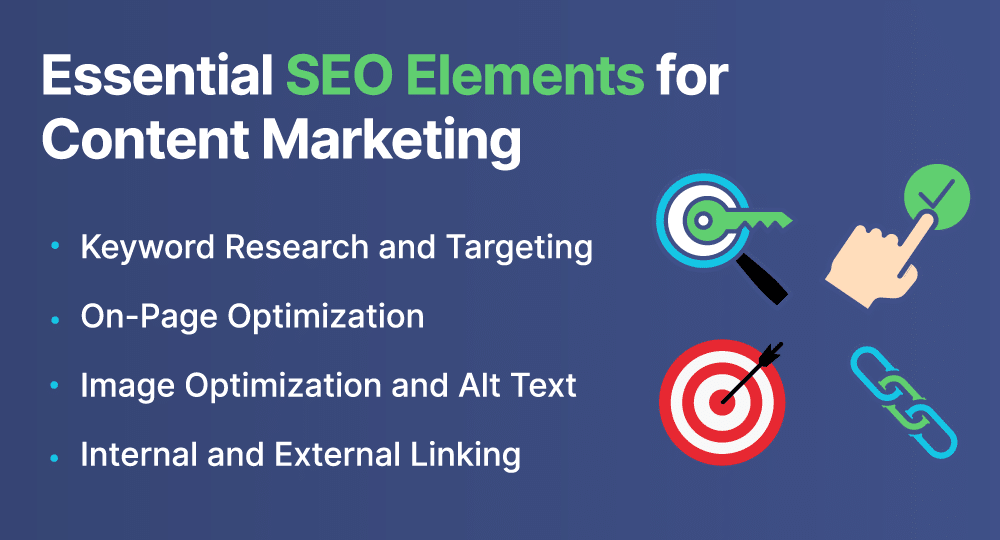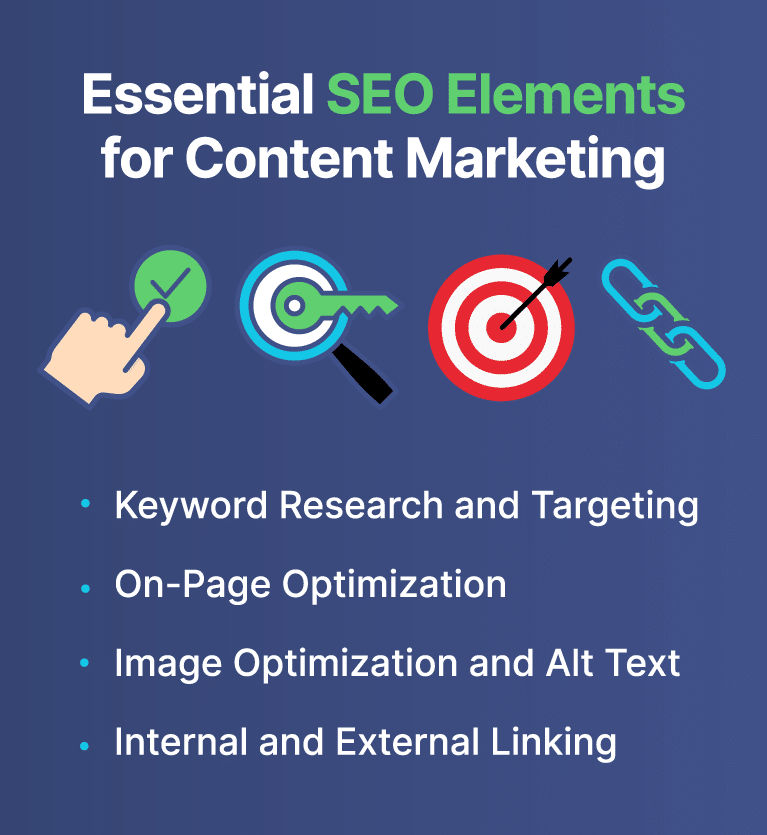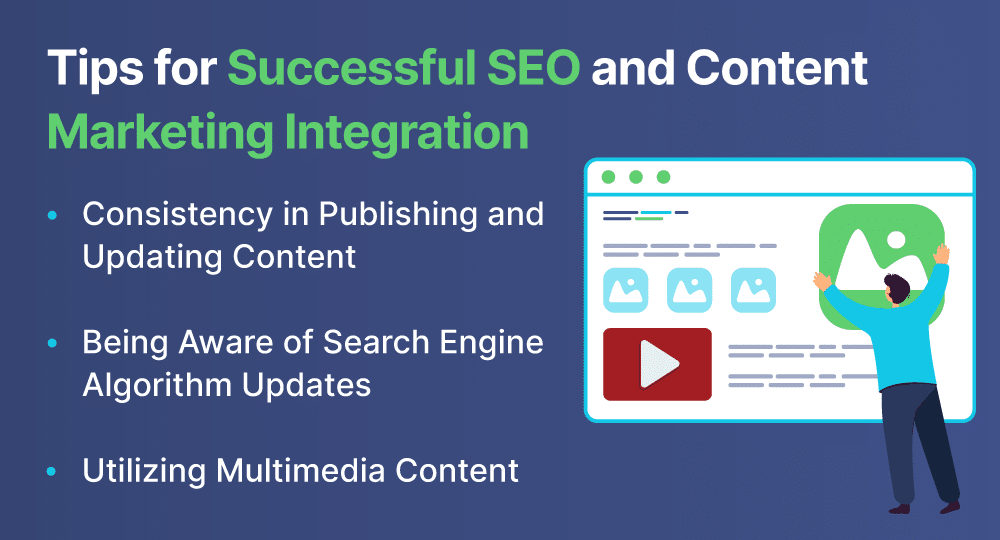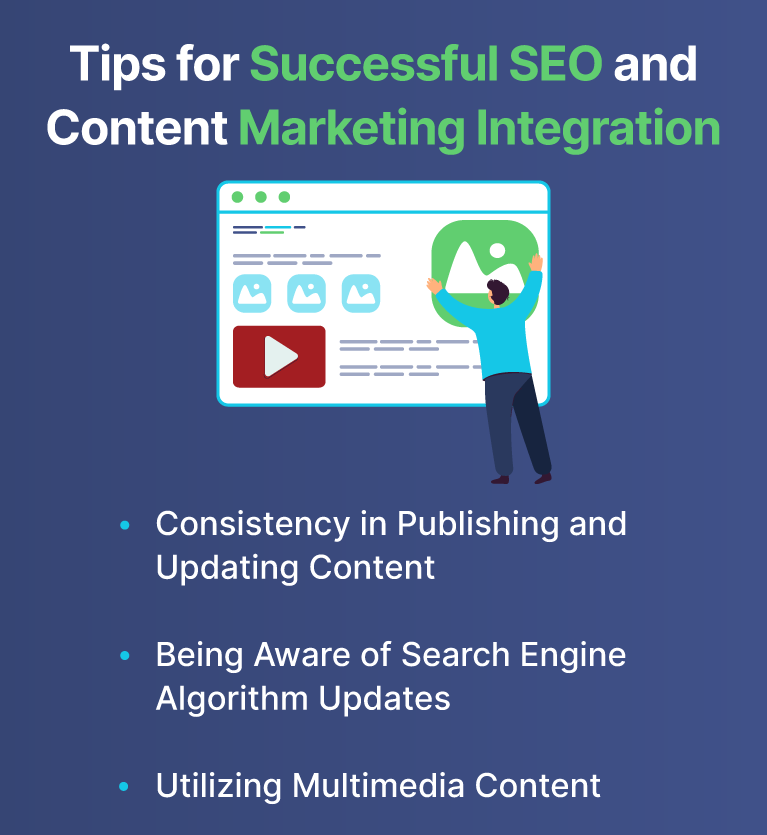The key to driving traffic and boosting sales lies in the seamless integration of search engine optimization (SEO) and content marketing. By understanding the synergy between these two powerful strategies, businesses can attract organic search traffic, increase online visibility, and establish a strong brand presence. In this blog post, we will discuss practical tips and strategies for leveraging SEO and content marketing, as well as introduce AI-powered content strategy engines like ConvertIQ that streamline the content creation and optimization process. So, whether you’re a business owner, marketer, or entrepreneur looking to enhance your content marketing efforts, read on to discover how you can harness the combined power of SEO and content marketing to achieve impressive results.
The Importance of Integrating SEO and Content Marketing
SEO and content marketing are integral components of an effective digital marketing strategy. Most modern shoppers navigate the web via search engines and research online before committing to buying. By combining these two strategies, businesses can create a powerful synergy that amplifies their online visibility and allows them to attract more organic traffic. This, in turn, helps boost credibility and authority in the eyes of search engines and potential customers alike.
When implemented effectively, SEO and content marketing complement each other to create a cohesive and efficient strategy. SEO helps ensure that your content is discoverable by search engines, while high-quality content keeps users engaged and encourages them to take action. By understanding and leveraging the relationship between these two components, businesses can greatly increase their chances of success in today’s competitive digital landscape.
Essential SEO Elements for Content Marketing
To maximize the effectiveness of content marketing and SEO, there are several essential elements that need to be addressed. These include keyword research and targeting, on-page optimization, image optimization, internal and external linking strategies, and more. By understanding and leveraging these tactics, businesses can ensure that their content is discoverable, relevant, and optimized for search engine rankings.


Keyword Research and Targeting
Keyword research and targeting are crucial components of content marketing. Identifying the right keywords to target helps optimize your content for search engines and ensures that it reaches the right audience. Utilize keyword research tools like Google Keyword Planner or SEMrush to discover relevant, high search volume keywords with low competition.
On-Page Optimization
On-page optimization involves refining various elements of your content to improve search engine rankings. Pay close attention to meta tags, headings, and URL structures, as these components help search engines understand your content’s context and relevance. Ensure that your title tags and meta descriptions are optimized with relevant keywords and crafted to entice users to click through to your content.
Image Optimization and Alt Text
Image optimization and alt text play a significant role in improving your content’s SEO. By compressing images to reduce file size and using descriptive alt text, you can enhance page loading speeds and provide search engines with valuable information about your content’s visual elements. This ultimately contributes to higher search rankings.
Internal and External Linking
Internal and external linking strategies help search engines navigate your website and assess its authority. Incorporate internal links to connect relevant content on your site, and seek out high-quality external links to reputable sources that support your content’s claims. These strategies not only improve the user experience but also boost your content’s credibility and search visibility.
Creating Optimized Content
Creating optimized content is essential for improving SEO and driving traffic. Ensuring that your content is relevant, engaging, and optimized for search engine rankings is key to achieving success with content marketing. To make sure your content is optimized for SEO, there are several tactics and best practices to keep in mind.

Crafting Engaging, Informative, and Relevant Content
Crafting engaging, informative, and relevant content is essential to capturing your audience’s attention and retaining their interest. Focus on providing valuable insights, addressing common questions or challenges, and offering actionable solutions. By developing high-quality content that is both useful and enjoyable to read, you can increase the likelihood that visitors will share your content and return for future articles.
Prioritizing Readability and User Experience
Prioritizing readability and user experience is crucial for both your audience and search engines. Ensure your content is well-structured with clear headings, bullet points, and short paragraphs to make it easy to scan and digest. Additionally, consider incorporating multimedia elements such as images, videos, and infographics to break up large blocks of text and enhance the overall user experience.
Promoting Long-Form Content
Promoting long-form content and pillar pages can help boost your SEO efforts by providing comprehensive, in-depth information on a specific topic. This type of content is more likely to rank higher in search results, as search engines recognize the value it provides to users. Additionally, by aligning blog posts and webpages around a central theme such as an informational guide or “pillar page”, businesses may be eligible to receive the Google Featured Snippet for improved visibility.
Measuring and Analyzing SEO and Content Marketing Performance
Measuring and analyzing SEO and content marketing performance is essential for assessing the effectiveness of your strategies. Some key performance indicators to monitor include organic traffic, time on page, bounce rate, and conversion rate. These metrics provide insights into user behavior and engagement, helping you identify areas for improvement and optimize your content marketing strategy.
Monitoring keyword rankings and search visibility allows you to understand how well your content is performing in search engine results. Regularly reviewing these metrics helps identify trends and opportunities to target new keywords or improve existing content. Additionally, you can use analytics tools such as Google Analytics and Search Console to track organic search keywords and examine how users interact with your content.
Leveraging AI-Powered Content Strategy Engines
Generating high-quality, SEO-optimized content regularly is time-consuming and labor-intensive. AI-powered content strategy engines, such as ConvertIQ, help automate and optimize the process, allowing you to create high-quality and SEO-friendly content with ease.
Enhancing content optimization with ConvertIQ involves using AI technology to analyze your target audience, identify relevant keywords, and generate content ideas tailored to your business and industry. It then provides actionable insights to guide you in optimizing headings, meta tags, internal and external linking strategies and more. ConvertIQ also offers automated keyword monitoring capabilities so you can track your content’s performance over time.
One of the primary benefits of using AI for SEO and content marketing is its ability to process and analyze vast amounts of data quickly. This enables AI-powered tools like ConvertIQ to uncover insights, patterns, and trends that can be used to inform and improve your content strategy. By analyzing the unique data of your website and real-time search volume for keywords and topics, ConvertIQ swiftly generates a multitude of content strategy ideas tailored to your specific needs. This helps you target the right keywords and topics, maximize your reach, and optimize content to ensure it is strategically aligned with search intent.
Another advantage of leveraging AI-powered content strategy engines is their ability to learn and adapt over time. As these tools analyze your content and track its performance, they continuously refine their algorithms to provide even more accurate and relevant suggestions, helping you stay ahead of the competition and drive better results.
Tips for Successful SEO and Content Marketing Integration
Successfully integrating SEO and content marketing requires a strategic approach. From optimizing content for search engine rankings to leveraging AI-powered tools to streamline the process, there are several tactics businesses can use to maximize the effectiveness of their content marketing efforts. Here are a few tips to consider when leveraging the synergy between SEO and content marketing.


Consistency in Publishing and Updating Content
One crucial aspect of successful SEO and content marketing integration is maintaining consistency. Regularly publishing new content and updating existing pieces ensures your website stays fresh and relevant. Additionally, fresh content boosts search engine rankings and helps keep readers coming back for more.
Being Aware of Search Engine Algorithm Updates
Stay informed about search engine algorithm updates, as they can affect your website’s rankings and visibility. Adjust your content strategy accordingly to align with the latest SEO best practices, ensuring your content remains optimized and continues to perform well in search results.
Utilizing Multimedia Content
Diversify your content by incorporating multimedia elements such as videos, infographics, and podcasts. Using interactive elements helps keep users engaged and increases the likelihood of returning for more. Additionally, multimedia content is more shareable, increasing the likelihood of earning backlinks and improving your SEO.
ConvertIQ: Your AI-Powered Content Marketing Solution
Features and benefits of ConvertIQ include automatic keyword research, content optimization suggestions, and performance tracking. These capabilities not only save time and effort but also ensure that the content you produce is aligned with search engine best practices and effectively targets your audience.
By using ConvertIQ, businesses can create relevant, engaging, and optimized content more efficiently, resulting in increased organic search traffic and higher conversion rates. This AI-driven platform also provides valuable insights and analytics to help you continually refine your content marketing strategies and measure their success.
Case studies and testimonials from satisfied customers showcase the transformative power of ConvertIQ in driving traffic and sales. By harnessing the synergy between SEO and content marketing, businesses that leverage ConvertIQ are well-equipped to achieve their online visibility and revenue goals. A satisfied ConvertIQ user raved:
“I am thrilled that it evaluates the data from my website and then gives me the top articles I should write about. But then it generates the article, and I spend about 30 min tweaking it, and we’re done! I’m very excited about the opportunity to add more content to our site to drive traffic.”
Conclusion
In this blog post, we outlined why integrating SEO and content marketing is essential for businesses looking to increase their online visibility and boost sales. We then discussed practical tips on how to leverage the combined power of these two strategies. By focusing on essential SEO elements, creating high-quality, optimized content, and consistently measuring and analyzing your performance, you can elevate your online presence and achieve lasting success.
Incorporating AI-powered content strategy engines like ConvertIQ into your content marketing efforts can significantly streamline the content creation and optimization process, allowing you to focus on what matters most: growing your business. Don’t miss out on the opportunity to supercharge your SEO and content marketing strategies. Contact ConvertIQ today and experience firsthand how artificial intelligence can revolutionize the way you approach your online marketing efforts.
